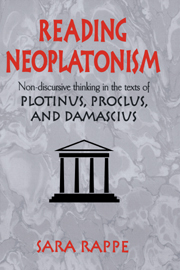Book contents
- Frontmatter
- Contents
- Preface: Discursive Strategies and Neoplatonic Texts
- Acknowledgments
- List of Abbreviations
- 1 Introduction. Representing a Tradition: Exegesis, Symbol, and Self-reflection
- PART I LANGUAGE IN THE ENNEADS
- 2 Plotinus' Critique of Discursive Thinking
- 3 Non-discursive Thinking in the Enneads
- 4 Introspection in the Dialectic of the Enneads
- 5 The Symbolism of the Enneads
- PART TWO TEXT AND TRADITION IN NEOPLATONISM
- References
- General Index
- Index Locorum
2 - Plotinus' Critique of Discursive Thinking
Published online by Cambridge University Press: 24 October 2009
- Frontmatter
- Contents
- Preface: Discursive Strategies and Neoplatonic Texts
- Acknowledgments
- List of Abbreviations
- 1 Introduction. Representing a Tradition: Exegesis, Symbol, and Self-reflection
- PART I LANGUAGE IN THE ENNEADS
- 2 Plotinus' Critique of Discursive Thinking
- 3 Non-discursive Thinking in the Enneads
- 4 Introspection in the Dialectic of the Enneads
- 5 The Symbolism of the Enneads
- PART TWO TEXT AND TRADITION IN NEOPLATONISM
- References
- General Index
- Index Locorum
Summary
In this chapter, I want to look more closely at the Neoplatonic critique of discursive thinking, as part of a more general discussion of philosophical method in the Enneads. One issue that demands immediate attention is how we ought to conceive of philosophical method in Neoplatonic texts. This chapter will explore dialectic in the Enneads, with particular emphasis on its contrasts with both Stoic and Aristotelian dialectic, as well as with more contemporary philosophical methodologies. This chapter is largely negative in its conclusions, showing more what the dialectic is not than what Neoplatonic dialectic includes. In this respect, it introduces the subsequent chapters that explore a variety of dialectical strategies that nevertheless presuppose this central critique of discursive thinking.
Let me start with the modern distinction between ontological commitments and epistemological commitments invoked, for example, to examine versions of philosophical realism. Realism has been described as the belief that reality exists independently of any [human] representation of it. Expressed in this way, modern philosophical realism is not an epistemological theory and entails neither a theory of truth nor a privileged, unique description of the world. In other words, if one holds some version of philosophical realism, it may turn out that truth (one's representation of the world) and reality coincide – that our representations accurately reflect the way things are – or it may not.
Information
- Type
- Chapter
- Information
- Reading NeoplatonismNon-discursive Thinking in the Texts of Plotinus, Proclus, and Damascius, pp. 25 - 44Publisher: Cambridge University PressPrint publication year: 2000
